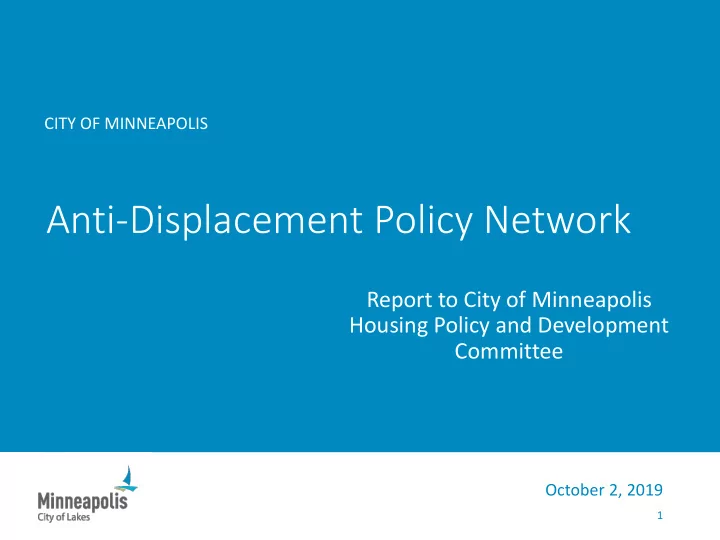

CITY OF MINNEAPOLIS Anti-Displacement Policy Network Report to City of Minneapolis Housing Policy and Development Committee October 2, 2019 1
Strategic & Racial Equity Action Plan: Housing 2
HOUSING Strategic Need: The City of Minneapolis relies on rental Reduce involuntary property owners to provide safe, stable housing for more than half of its residents. displacement in Through our rental licensing authority, the City has a unique relationship with rental rental housing for property owners that can be more effectively leveraged in upstream activities Black, Indigenous, to ensure racially and ethnically diverse residents who rent their homes are and People of equitably supported in meeting their needs for safe, affordable and accessible housing. Color communities 3
HOUSING METRICS OF URGENCY • Count/percent of Tier 2 and 3 units located PROBLEM OVERVIEW in 55411, 55412 and 55404 that improve • BIPOCI communities experience their Tier assignment higher eviction rates. • Number of service requests made to • Evidence suggests BIPOCI Regulatory Services by residents in 55411, communities also experience 55412 and 55404 involuntary rental displacement • Number of Tier 2 and 3 property owners outside of eviction process. that attend the rental property owners • Poorly maintained units affect housing management course stability for BIPOCI residents which can lead to increased displacement. GOAL Residents renting in zip codes 55411, KEY LAGGING INDICATOR 55412, and 55404 reside in safe, habitable, • affordable, secure/stable, and respectful homes Count and percent of eviction filings until they choose to leave. and judgements. • Count and percent of Notices to Vacate or other communication VITAL FEW PROJECTS directing residents to move. Develop the institutional capacity to better • Frequency of move/relocation and leverage the relationship the City has with whether the move is voluntary or rental property owners to minimize involuntary involuntary. displacement. 4
Anti-Displacement Policy Network Photo credit: PolicyLink Network Goal: For low-income people, Indigenous people, marginalized LGBTQ people, and people of color to experience increased housing security and less housing, business, and cultural displacement in their communities. 5
Participating Cities • Austin, TX • Philadelphia, PA • Boston, MA • Portland, OR • Buffalo, NY • San Jose, CA • Denver, CO • Sante Fe, NM • Nashville, TN • Minneapolis/St. Paul 6
7
Community Forums 8
MSP Team Themes 1. Reframe the narrative 2. Community ownership 3. Equitable development 4. Tenant protections and preservation of affordable housing 5. Community engagement 6. Regional approach 9
Benefits and Challenges Benefits • Confirmation of existing strategies • New policy ideas • Open discussion among team members • Strong relationships and partnerships Challenges • Cross-jurisdictional work • Deciding how to prioritize • Working through differing viewpoints and positions 10
Minneapolis Strategies • Minneapolis 2040, Unified Housing Policy, program policies and guidelines • Ordinances: • Inclusionary Zoning • Renter Protections • Advance Notice of Sale • Investments: • Affordable Housing Trust Fund • NOAH preservation and tenant purchase opportunities • Eviction and habitability legal representation • Minneapolis Homes: owner occupied rehab, new production, downpayment assistance • Homebuyer capacity 11
Next Steps • Pilot anti-displacement strategies at key development sites • Explore preference policy • Community ownership strategies • Long-term Affordability Models • Cultural Corridors • Quarterly MSP Team Meetings • Continued information exchange with network cities 12
Questions? Anti-Displacement Policy Strategic & Racial Equity Network Action Plan Katie Topinka Joy Marsh Stephens Housing Policy Coordinator, Director, Division of Race & CPED - Housing Equity Katie.Topinka@ Joy.Stephens@ minneapolis.mn.gov Minneapolis.mn.gov 13
Recommend
More recommend